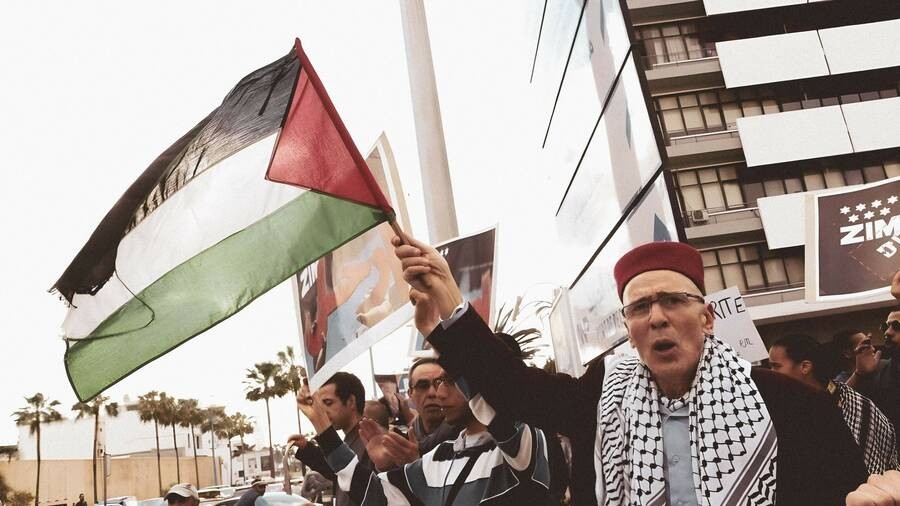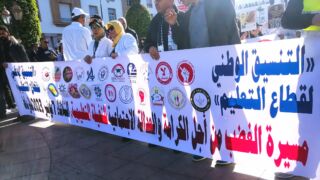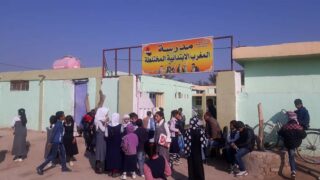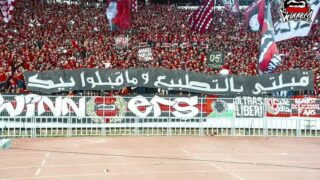Driss Ksikes, Khalid Lyamlahy, Arthur Asseraf, and Michèle Sibony with translation from the French by Omar Berrada
Roundtable | Jewish Currents, November 21, 2025
Sion Assidon died at age 77 on Friday, November 7th, 2025, after three months in a coma. Official, though vigorously disputed, reports describe the cause as a fall while gardening at his home in Mohammedia. Below, four writers reflect on the enduring meaning of the Moroccan Jewish activist’s life.
On November 9th, in Casablanca’s Jewish cemetery, hundreds of Moroccans—Jews and Muslims, family members, friends, activists, and acquaintances—attended the funeral of Sion Assidon, a former communist and a steadfast anti-Zionist. All around, Palestinian flags flew: a final act of resistance. Resistance to what? To his country normalizing relations with Israel for “security reasons.” To the widespread complicit silence in the face of a genocide that Israel’s neocolonialist leaders have been perpetrating in Gaza after two decades of siege.
Assidon’s was the struggle of a generation. Along with Edmond Amran El Maleh, Abraham Serfaty, Simon Levy, and Raymond Benhaïm (the only one still living), he was among a handful of Moroccans, politically left-wing and culturally Jewish, who experienced the orchestrated displacement of their co-religionists through a mythicized aliyah from the late 1950s—and understood this displacement as Zionism’s other crime and as a first act of normalization by the Moroccan authorities. From a secular and internationalist perspective, Assidon saw how the propaganda that lured the Sephardic Jews of the Arab Amazigh world to a promised land impoverished his society, stripping it of a pluralism that had spanned millennia.
Assidon stood at one extreme of this generation. Like the Palestinian poet Samih al-Qasim, whom he admired, he did not compromise; he resisted. Assidon believed that, at its core, the Palestinian cause is a matter of human justice, that its rationale is one of righting wrongs—and, as such, does not allow for half measures. This radical ethic is linked not only to his rejection, like other anti-Zionist Jews, of the nationalization of Jewishness, which ethnicizes and therefore racializes it, but also, more fundamentally, to an unyielding ethic of transparency and truth, and therefore a rejection of double standards. This stems from his long-waged fight against corruption in Morocco and his feeling that normalization with Israel, regardless of the rationale behind it, constitutes an act of moral bankruptcy.
Assidon believed that, at its core, the Palestinian cause is a matter of human justice, that its rationale is one of righting wrongs—and, as such, does not allow for half measures.
For Assidon, semantics was key. Words must be clarified and situations renamed in order to ensure precise meaning. The final time I saw him was in a bookstore in Casablanca last June, during a meeting about “other narratives” in relation to Palestine. He specified that, for him, the Zionist occupation was not just a matter of “settlement” (“istīṭān”) but, even worse, of “replacement” (“iḥlāl”). In a recent interview with the Turkish publication Nouvelle Aube, he systematically avoided naming Israel, referring to it only as “the occupying state”; and he similarly distanced himself from the idea of “the Jewish people,” speaking instead of “diverse Jewish communities.” In this respect, Assidon echoed the approach of historian Shlomo Sand, who, in The Invention of the Jewish People, refutes the fallacious Zionist myth of diasporic return, pointing out that what is gathered under the banner of “the Jewish people” is really various peoples of multiple origins. Hence, Assidon was outraged at the increasingly common conflation of Moroccan Jews, with their diverse beliefs and sensibilities, and Israelis of Moroccan origin, some of whom have been complicit in the ethnic cleansing of Palestinians.
Assidon’s anti-Zionist struggle was not a discursive act; it was an activist’s concrete commitment. Since its inception in 2010, Assidon has been the standard-bearer of Boycott, Divestment, Sanctions (BDS) Morocco—and since October 7th, 2023, as the movement experienced a surge of interest, he was eager to facilitate the mobilization of young activists in academic, artistic, and cultural circles where, in his view, the insidious infiltration of Zionism warranted constant vigilance. He was also vocal about the long-complicit agricultural and military sectors, which he felt have not been scrutinized enough. Assidon was always keen to point out the unspeakable and denounce the unnamable. He did it so calmly, with a firm and discreet smile that made clear how fully and serenely he rejected injustice, the concealment of major facts, and the manipulation of historical truths.
—Driss Ksikes, translated from the French by Omar Berrada
Last year, Sion Assidon explained in an interview with The Voice of Morocco that the meaning of his Amazigh family name bears relation to “link,” adding with an amused smile that his work may be nothing more than “bringing people together.” Indeed, through his identity and political trajectory, Assidon embodied connections that contest authoritarian and imperial orders—between Jews and Muslims, Amazighs and Arabs, Morocco and Palestine, local campaigns and global struggles, political rebellion and transnational solidarity—even when the steadfastness of his commitments paradoxically led to his own isolation.
Born in 1948 in Agadir to Amazigh Jewish parents, Assidon was formatively influenced by early exposure to a series of significant political events. As a child, he witnessed the fervent struggle that led to the country’s independence in 1956. Four years later, after a devastating earthquake leveled his hometown, Assidon relocated to Casablanca, where he attended French high school and participated in Jewish youth scouting groups; in this context, he observed the state-facilitated migration of Moroccan Jews to Israel amid the siren calls of Zionism. In March 1965, 17-year-old Assidon tried to join the student protests against a controversial educational reform, and although his family prevented him from participating, the uprisings, which ended in bloody repression, remained vivid in his memory. The following year, he moved to Paris to study mathematics, and the shockwaves from the Vietnam War and the Six-Day War—two spectacular assertions of colonial destruction—that were reverberating across Europe fortified the principle that would guide the rest of Assidon’s life: a deep sense of solidarity with the oppressed and a firm commitment to justice.
Through his identity and political trajectory, Assidon embodied connections that contest authoritarian and imperial orders.
It Is Not Just About Gaza and Palestine
18-01-2025
When Assidon returned to Morocco in 1968, he found his homeland in a period of mounting political repression. Dubbed the “Years of Lead,” the era was characterized by the suppression of those who dared to criticize the authoritarian regime of King Hassan II. Assidon swiftly took on important roles in several organizations critical to the swelling leftist opposition, including as a co-founder of 23 Mars, a Marxist–Leninist group committed to revolutionary transformation and—after tensions about strategy fractured that group—as a member of the Maoist collective Let’s Serve the People. In 1972, he was arrested and tortured in Rabat’s infamous secret detention center Dar El Mokri before standing trial the next year. For the crime of “violating state security,” Assidon was sentenced to 15 years in prison. It was only after a robust international campaign that he was finally pardoned in 1984 (though his passport and right to travel were not restored for another eight years). Following his release, Assidon continued to work toward the realization of his resolutely anti-Zionist and humanist ideals, especially as a founding member of both Transparency Maroc, an NGO dedicated to the fight against systemic corruption, and the Moroccan branch of the Palestinian-led BDS movement—regularly leading boycott campaigns and participating in pro-Palestinian protests.
In losing Assidon, we have doubtless lost a crucial link in the chain of political struggles that shaped the country’s postcolonial history. His passing marks the fading of a vibrant generation of anti-Zionist Moroccan Jewish activists who insisted that Judaism remains a constitutive element of the Moroccan landscape, firmly anchored in a national identity shared across religious and linguistic traditions. Still, his legacy remains alive in the values that he championed with astonishing energy. In Morocco, Assidon’s close friends affectionately called him the traditional name “El Maâti”—probably first bestowed during his years in the underground militancy —which holds in its roots the ideas of giving and generosity, virtues for which Assidon will always be remembered, and that we might hope to see carried forward.
— Khalid Lyamlahy
When it comes to politics, Moroccan Jews are rarely treated as individuals. Particularly on the subject of Palestine, the entire community is seen as a bloc. Our ranks have included both committed anti-imperialists who refused to leave their countries of birth, and others who have been at the forefront of the global right and settler colonialism. But depending on who you ask, you will be told that all of us are either on the left or on the right. One popular version of the story goes like this: Moroccan Jews are victims of Zionism. Bad, racist Ashkenazis erased our histories and forced us to do wicked things. If only we were permitted to access our own pasts, we would remember how our grandmothers baked cakes with their Muslim neighbors, and our true fundamental opposition to the occupation of Palestine would shine through. Another common narrative is not much better: Moroccan Jews—along with others called “Mizrahi” by Israelis—are the ones who poisoned the Israeli project. Zionism in 1948, they say, was a happy, progressive movement led by socialist secular Europeans who lived in peace with the Arabs, until backwards fanatical Jews from across the Middle East and North Africa came in and turned the whole thing conservative, religious, and violent. The sad part is that it’s not just external observers who foist these narratives upon us; often, we are the ones who tell these stories about ourselves.
The blazing activism that defined Sion Assidon’s life helps us move beyond these clichés. For him, to be on the left as a Moroccan Jew was not a given; it was a commitment. He expressed no inherent affinity with other members of the community. Instead, his lifelong struggle against oppression in all its forms could include criticizing those Moroccan Jews who had become colonizers. For example, when Morocco normalized relations with Israel in 2020, Assidon issued a scathing critique against “our Moroccan brothers (who occupy Palestine!).” He dismantled the dominant rationale that formalizing cooperative ties between the two states would allow Morocco to resume relations with Jews from Morocco who now lived in Israel: “It’s a neat little double magic trick, which makes the settlers—‘our Moroccan brothers’—innocent of their contribution to war crimes and crimes against humanity against the Palestinian people, and it also tries to whitewash the Moroccan regime’s original double crime of transforming Moroccan citizens into colonial mercenaries.” By “double crime,” Assidon was referring to the Moroccan king Hassan II’s collusion with Zionist migration agencies in the 1960s, when the king facilitated the mass departure of Moroccan Jews in exchange for financial compensation, effectively selling off his subjects. At the time, Assidon was already lucid about the connections between colonialism in Palestine and authoritarianism at home. To him, Arab regimes like Hassan II’s bore some responsibility for the success of Zionism in Palestine, and one could not fall without the other.
The world was cleaved in two, not between Muslims and Jews or Israelis and Palestinians; but between those who, like him, resisted imperialism in all its forms, and those who did not.
This dissident position was never an easy one. Like other anti-Zionist Moroccan leftists, such as Abraham Serfaty, Assidon was tortured and incarcerated under Hassan II. “I have used an image to try and communicate what prison is like: We are like Palestinian refugees in their camps,” Assidon wrote from jail in a 1980 letter published by his supporters: “Every moment has the taste of exile. It does not mean that there are no moments of joy, of laughter, of song. But prison remains present in every gesture.” To Assidon, kinship with the Palestinian struggle had nothing to do with where one was born. It came out of a shared experience of dispossession and a common political vision. The world was cleaved in two, not between Muslims and Jews or Israelis and Palestinians; but between those who, like him, resisted imperialism in all its forms, and those who did not. This, too, is the legacy he leaves us with: a resonant reminder that all of us, whatever community we belong to, have the same duty to fight colonialism wherever we encounter it.
— Arthur Asseraf
Some lives look like destiny. This seemed, perhaps, the case for our friend Sion Assidon—from the Agadir earthquake that marked his childhood (“Huddled in the back of a car at night, I remember wishing that the sun wouldn’t rise over the chaos. But the sun did rise and I was brutally thrust out of childhood, in a small town wiped off the map,” he recalled) to his young adulthood and his home crushed by “the Years of Lead” he spent in prison (age 24 to 36!) to the excruciating losses of and separations from so many loved ones . . . But, despite everything, one must choose—to live, overcome obstacles, continue to fight, to laugh, to love.
One could not take a stroll with Sion anywhere in Morocco without someone coming up to shake his hand. “A former prisoner,” he would say each time. A true brotherhood—smiles and weighted glances, news of mutual friends and their families, cordial pats on the shoulder. One must live after all, but one never forgets. “There is a place where I always feel best: alone in my little cell, inside my head,” he would say, another aftereffect of incarceration that was shared by many of his companions.
Sion’s funeral was a rare and magnificent event. The full courage, the popular struggle, the quiet force of Morocco was there.
And still, on this sad day, as Sion’s life slips away and assumes a final form that eludes and grips us at once, his friends numerously gather in Morocco and across the world, and his smile once again fills our screens. We feel the presence of his joviality, his singing, which he sometimes flaunted in the streets, very loudly and without a hint of embarrassment. “I sing,” he would say, “I practice Qigong. I take care of myself. You have to stay on your feet after all.” His appetite for life extended to all the fruits of Morocco’s soil—plants he would fondly caress as he smelled them, honeys from the Atlas Mountains, oils, citrons . . . His cherishing of food was a true act of love. Morocco was his mother and father, through all the setbacks, in every struggle.
Sion’s funeral was a rare and magnificent event. The full courage, the popular struggle, the quiet force of Morocco was there. They all came: formerly incarcerated comrades; human rights activists; compatriots from various movements and organizations—Attac Maroc, the Maghreb Social Forum, Transparency Morocco, Moroccan Labor Union, BDS Morocco; members of left-wing parties—the Party of Progress and Socialism, the Democratic Way, the Unified Socialist Party; and many more. And Palestine was omnipresent because everyone there shared with Sion a commitment to the struggle against imperialism and other destructive orders wherever they are found, including the recolonization of Morocco, the extraction of its wealth and its forces in the service of the worst.
The tranquil entrance of this crowd into the cemetery, and the immense respect and affection these men and women showed constituted a veritable consolation and a true message of peace. A friend who was there told me that Sion’s coffin was carried under the supervision of a rabbi, by, among others, a conservative Muslim human rights activist, a communist, a Maoist, and BDS activists. This popular tribute to their comrade and kinsman showed the world that a Moroccan people exists, bound by a thirst for justice. May this model of humanity be replicated everywhere. The world needs it. And may the earth of his homeland rest lightly upon its son.
— Michèle Sibony, translated from the French by Omar Berrada
Special thanks to Omar Berrada for his curatorial work on this roundtable.




